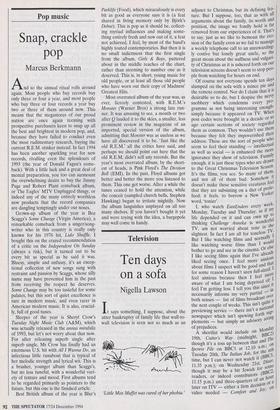Pop music
Snap, crackle pop
Marcus Berkmann
And so the annual ritual rolls around again. Most people who buy records buy only three or four a year, and most people who buy three or four records a year buy two or three of them around now. This means that the megastores of our proud nation are once again teeming with prospective purchasers keen to snap up all the best and brightest in modern pop, and, because they have failed to conduct even the most rudimentary research, buying the current R.E.M. stinker instead. In fact 1994 has been another sparkling year for new records, rivalling even the splendours of 1993 (the year of Donald Fagen's come- back). With a little luck and a great deal of mental preparation, you too can surmount the overwhelming desire to buy the Jimmy Page and Robert Plant comeback album, or The Eagles' MTV Unplugged thingy, or indeed any of the many entirely worthless new products that the record companies are dangling temptingly under our noses.
Grown-up album of the year is Boz Scaggs's Some Change (Virgin America), a remarkable comeback from a singer/song- writer who in this country is really only known for his 1976 hit, Lido Shuffle. I bought this on the crazed recommendation of a critic on the Independent On Sunday (always a risk), but it turned out to be every bit as special as he said it was. Bluesy, simple and unfussy, it's an excep- tional collection of new songs sung with restraint and passion by Scaggs, whose silly name may have prevented him in the past from receiving the respect he deserves. Some Change may be too tasteful for some palates, but this sort of quiet excellence is rare in modern music, and even rarer in American modern music. It is also, crucial- ly, full of good tunes.
Sleeper of the year is Sheryl Crow's Tuesday Night Music Club (A&M), which was actually released in the annus mirabilis of 1993, but let's not worry about that now. For after releasing superb single after superb single, Ms Crow has finally had an enormous U.S. hit with All I Wanna Do, an infectious little runabout that is typical of her melodic strength and lyrical wit. This is a brasher, younger album than Scaggs's, but no less tuneful, with a wonderful vari- ety of texture and mood. First albums tend to be regarded primarily as pointers to the future, but this one is the finished article.
Best British album of the year is Blur's Parklife (Food), which miraculously is every bit as good as everyone says it is (a feat shared in living memory only by Bjork's Debut). This is pop as it should be, collect- ing myriad influences and making some- thing entirely fresh and new out of it, a feat not achieved, I feel, by most of the band's highly touted contemporaries. But then it is no small indictment that the first single from the album, Girls & Boys, puttered about in the middle reaches of the chart, rather than storming to number one as it deserved. This is, in short, young music for old people, or at least all those old people who have worn out their copy of Madness' Greatest Hits.
Most overrated album of the year was, as ever, fiercely contested, with R.E.M.'s Monster (Warner Bros) a strong late run- ner. It was amusing to see, a month or two after Q lauded it to the skies, a smaller, less prominent review in the magazine of an imported, special version of the album, admitting that Monster was as useless as we have all discovered it to be. 'Just like the old R.E.M.' all the critics have said, and perhaps we should point out here that the old R.E.M. didn't sell any records. But the year's most overrated album, by the short- est of heads, is Pink Floyd's The Division Bell (EMI). In the past, Floyd albums got better and better the more you listened to them. This one got worse. After a while the tunes ceased to hold the attention, while the conceit (sampled church bells, Stephen Hawking) began to irritate mightily. Now the album languishes unplayed on all too many shelves. If you haven't bought it yet and were toying with the idea, a bargepole may well come in handy.










































































































 Previous page
Previous page